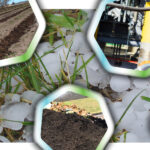
Nora Goldstein
BioCycle May 2017
Time flies, so events and experiences that I think happened a couple of years ago often took place a few years before that! With this as a caveat, in the not too distant past (say 5 years ago?), I remember first noticing how the mainstream media would refer to compost or composting without actually defining the terms. We took it as a sign to mean the public’s knowledge about the practice and the product was pretty widespread.
A downside of these terms becoming commonplace is that the potential to misuse them increases. As such, many newspaper articles, as well as organics recycling initiatives, will refer to the organics separated for collection as “compost,” or label the organics or food waste bin in a cafeteria or other point of generation as “compost.” Why not? It’s simple and direct, and often there are photos of the items allowed in the bin. An apple core isn’t compost, nor is a food-soiled napkin. It’s obvious, right? Why complicate matters?
Because in reality, casual use of the word “compost” can be quite problematic, and ultimately confuse the consumer, be it a restaurant, university or household. If a vendor is selling a food waste generator a machine that churns out “compost” in a few days, how is that different than a compost manufacturing facility that takes 60 to 180 days (or longer) to make compost? Are they the same?
We dove into this conundrum at the April 3 Spring Dialogue of the Composting Collaborative, where 30 members of the Collaborative gathered prior to BioCycle EAST COAST17. Ahead of the meeting, GreenBlue, BioCycle and the US Composting Council — founders of the Composting Collaborative — were discussing technologies entering the broader consumer marketplace, e.g., businesses, institutions and homes, that make bold claims to process food waste in a matter of hours or days, discharging a ready-to-use compost or fertilizer. We decided to have a panel discussion at the Spring Dialogue titled, Accelerating the Decomposition Process: Evaluating the Claims. Panelists were Brenda Platt and Linda Bilsens of the Institute for Local Self-Reliance, Bob Rynk, Associate Professor at SUNY Cobleskill and a composting educator, and myself.
I led off by asking the question, “Can you speed up composting? And should you?” Bilsens gave a brief overview of the foundations of composting science and both the chemical and physical processes that take place to create stable and mature composts. Rynk then raised the question about where exactly the line is between mature and not mature or stable and unstable compost. If dehydrated material is stable only until it is made moist again, is it really stable? If organic matter is heat-treated to an extent that it kills microbial activity, would it improve soil health?
The U.S. composting industry is fortunate to have the USCC’s Seal of Testing Assurance, an established testing and certification program for compost products. At a minimum, potential buyers of these technologies that claim to make a ready-to-use compost or fertilizer should request that the equipment’s output undergo testing at an STA-approved laboratory.
Since the meeting, Collaborative members continue to discuss organics recycling semantics, for example, considering terms such as “intermediate pretreatment” of food waste on-site, followed by “final treatment” to ensure STA-compliant product quality. On behalf of the Collaborative, GreenBlue is taking the first crack at a Compost Manufacturing Value Chain infographic to illustrate the steps.
Indeed, the exposure in the broader consumer marketplace is exciting. Making sure this all unfolds in a productive way is about more than semantics.









